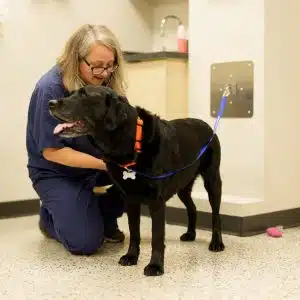Comprehensive Overview to the Solutions Offered by a Vet Oncologist
Veterinary oncology incorporates a large range of solutions aimed at treating and detecting cancer in pets. Veterinary Cancer Specialist. Oncologists employ innovative diagnostic strategies and offer various therapy alternatives customized per pet's needs. They likewise focus on supportive treatment and provide useful resources for pet dog owners. Recognizing these solutions is vital for making educated choices. What particular aspects of veterinary oncology can significantly influence a pet dog's treatment journey?
Comprehending Veterinary Oncology
Vet oncology is a customized field focused on detecting and treating cancer in animals. This technique encompasses a broad range of strategies, from clinical treatments such as chemotherapy and immunotherapy to surgical treatments targeted at eliminating lumps. Vet oncologists are educated to recognize the distinct symptoms of cancer in various types, enabling them to customize therapy strategies to private patients.
Along with standard therapies, vet oncology stresses encouraging treatment, which plays a crucial function in enhancing the high quality of life for afflicted animals. This includes discomfort management, dietary assistance, and palliative treatment choices. Partnership with pet dog owners is essential, as they are essential to decision-making regarding their animals' treatment courses. As study advances, veterinary oncology remains to evolve, using brand-new hope and boosted results for family pets identified with cancer cells. Overall, this area is basic for resolving the intricacies of cancer in companion animals.
Advanced Diagnostic Techniques
Advanced diagnostic strategies play a crucial duty in veterinary oncology, providing critical insights right into the visibility and degree of cancer in pets. Imaging techniques such as ultrasound, CT scans, and MRI are generally used to picture growths and assess their features. Furthermore, biopsy procedures are crucial for acquiring cells examples, allowing for clear-cut diagnosis and customized therapy strategies.
Imaging Modalities Utilized
Imaging modalities play an essential duty in the diagnosis and monitoring of cancer in animals. Vet oncologists use numerous sophisticated imaging techniques to examine tumor dimension, presence, and metastasis. Radiography, or X-rays, offers an initial sight of bone and chest problems, while ultrasound offers real-time imaging of soft cells, permitting thorough assessment of inner body organs. Computed tomography (CT) enhances visualization of complicated physiological frameworks and enables 3D restorations, assisting in accurate lump localization. Magnetic vibration imaging (MRI) is vital for soft cells differentiation, especially in mind growths. In addition, nuclear medication techniques such as positron discharge tomography (PET DOG) aid recognize metabolic task within lumps. Collectively, these methods improve diagnostic precision, guiding reliable treatment strategies for oncological clients.
Biopsy Procedures Described
Adhering to the initial assessment through imaging techniques, obtaining a definitive medical diagnosis usually needs tissue sampling with biopsy treatments. Vet oncologists utilize numerous biopsy strategies based on the tumor's location and characteristics. Fine needle aspiration (FNA) is a minimally invasive method that extracts cells for cytological evaluation, suitable for superficial masses. Core needle biopsies offer bigger cells examples and are valuable for much deeper growths, enabling for histopathological analysis. Surgical biopsies involve excising a portion or the entire tumor, facilitating extensive assessment. These procedures not only verify the visibility of cancer cells however also help establish its type and quality, leading therapy decisions. Each biopsy approach is picked meticulously to stabilize diagnostic accuracy with person safety and security and comfort.
Therapy Options for Cancer Cells in Pets
When an animal is detected with cancer, a selection of therapy choices become offered to assist manage the disease and boost high quality of life. Vet oncologists normally suggest a multidisciplinary approach tailored to the specific pet's requirements, which might include surgical procedure, radiation therapy, immunotherapy, or different therapies.
Surgical treatment is usually utilized to eliminate lumps and affected cells, possibly leading to total remission sometimes. Radiation treatment aims to target and ruin cancer cells, decreasing lump dimension and reducing signs - Veterinary Oncology Services. Immunotherapy takes advantage of the animal's body immune system to combat cancer more efficiently, while alternate treatments could consist of acupuncture or herbal supplements to support general wellness
Each therapy alternative carries its own benefits and risks, and veterinary oncologists work closely with animal owners to create a thorough plan that aligns with the pet's specific diagnosis and the owner's wishes. The supreme goal is to enhance the pet's comfort and quality of life throughout their cancer cells trip.
Radiation treatment for Pets
Radiation treatment is a typical treatment option for animals identified with cancer and is typically used together with other treatments laid out by vet oncologists. This treatment involves the administration of details medicines created to target and ruin cancer cells, thereby reducing lump dimension and stopping the spread of the disease. Vet oncologists customize chemotherapy methods based upon the kind of cancer, the pet's total health and wellness, and the wanted therapy outcome.
Side results can happen, as these drugs might likewise affect healthy and balanced cells. Typical reactions consist of nausea, throwing up, and momentary changes in cravings - Pet Cancer Surgery. Veterinary oncologists are equipped to handle these side effects properly, guaranteeing the pet's comfort throughout the treatment procedure. Routine surveillance with blood examinations and follow-up visits is necessary to evaluate the animal's response to chemotherapy and make essential adjustments. Ultimately, chemotherapy can supply considerable benefits, improving the quality of life for animals encountering cancer diagnoses

Radiation Therapy in Vet Medicine
Radiation treatment serves as an effective therapy choice for animals detected with localized tumors, using a targeted strategy to cancer management. This method utilizes high-energy radiation to harm the DNA of cancer cells, inhibiting their capacity to proliferate. It is specifically beneficial for lumps that are not amenable to medical removal or for situations where surgical treatment might not be feasible as a result of the tumor's area.
Veterinary oncologists customize radiation methods based on lump dimension, type, and place, along with the animal's total health. Treatment can be supplied by means of outside beam of light radiation or brachytherapy, each with distinctive advantages. Commonly, multiple sessions are needed to make the most of efficiency while minimizing side effects.
Although family pets might experience temporary reactions such as skin inflammation, the total aim is to diminish tumors and ease signs and symptoms, ultimately improving the pet dog's diagnosis and lifestyle. Appropriately, radiation therapy plays a necessary role in thorough cancer treatment.
Palliative Treatment and Lifestyle
Palliative treatment in vet oncology concentrates on enhancing the lifestyle for animals facing terminal illnesses, ensuring convenience and self-respect in their last days. This customized approach focuses on discomfort management, signs and symptom control, and emotional assistance. Vet oncologists examine each pet dog's specific demands, tailoring interventions to reduce discomfort and boost general well-being.
Techniques might include carrying out medicines for pain alleviation, taking care of queasiness, and dealing with other traumatic signs and symptoms. Additionally, dietary support is often given to preserve strength and boost hunger. The emotional aspect of palliative treatment is similarly important; developing a calm setting helps in reducing anxiety for both pet dog and owner.
Inevitably, the goal of palliative treatment is to enable pet dogs to appreciate their staying time with as much joy and dignity as feasible. By focusing on convenience and lifestyle, veterinary oncologists play a vital duty in guaranteeing that pets and their households browse this challenging trip with empathy and understanding.
Support for Animal Owners Throughout Treatment

Emotional Guidance for Owners
Charting the psychological landscape during a pet dog's cancer therapy can be an overwhelming experience for owners. The unpredictability surrounding medical diagnosis and prognosis can cause feelings of vulnerability, anxiety, and unhappiness. Veterinary oncologists recognize the value of psychological support and commonly give assistance to assist proprietors browse this challenging trip. Interaction is important; going over therapy alternatives and potential results can ease some worries. Furthermore, supplying reassurance that emotional reactions are valid fosters a helpful atmosphere. Several oncology clinics may likewise suggest support system or counseling services tailored for animal proprietors, helping with shared experiences. Motivating owners to prioritize self-care during this time is vital, as their emotional wellness straight affects their family pet's convenience and general treatment experience.

Resources and Educational Materials
Steering via the intricacies of a family pet's cancer therapy can be frightening for owners, making access to reputable resources and educational products important. Vet oncologists often provide a selection of handouts, pamphlets, and online materials that describe treatment alternatives, prospective negative effects, and treatment approaches. These sources help debunk the process and encourage pet dog proprietors to make educated choices. Furthermore, many oncology centers offer accessibility to sustain discussion forums and groups view publisher site where proprietors can get in touch with others encountering similar obstacles, fostering a feeling of neighborhood. Educational webinars and seminars conducted by vet specialists additionally enhance understanding, making sure that proprietors are fully equipped to browse their pet's journey via cancer cells treatment with self-confidence and expertise.
Frequently Asked Concerns
Exactly How Can I Prepare My Pet for a Veterinary Oncology Browse Through?
Preparing an animal for a vet oncology visit involves event clinical records, keeping in mind signs and symptoms, and guaranteeing the family pet fits. A tranquil behavior and acquainted things can assist ease stress and anxiety during the consultation.
What Are the Indicators My Pet May Have Cancer?
Signs that an animal might have cancer include unusual fat burning, persistent vomiting or diarrhea, unusual lumps or swellings, lethargy, modifications in cravings, difficulty breathing, and modifications in habits. Trigger veterinary interest is necessary.
Just How Can I Assistance My Pet Dog Psychologically Throughout Therapy?
Sustaining a pet dog psychologically throughout therapy includes giving convenience, maintaining routines, providing gentle love, and making certain a tranquil atmosphere. Taking part in silent play and regular friendship aids relieve stress and anxiety and cultivates a sense of safety and security.
Are There Alternative Therapies for Family Pets With Cancer?
Alternate treatments for animals with cancer cells consist of acupuncture, natural therapies, and nutritional assistance. These strategies might match conventional treatments, advertising overall health. Consulting with a vet is necessary for effective and risk-free integration of different therapies.
What Prices Should I Anticipate for Veterinary Oncology Solutions?
The expected prices for veterinary oncology solutions can vary significantly, often affected by diagnostics, treatments, and recurring care. Pet proprietors should plan for costs varying from assessments to specialized treatments, showing the intricacy of cancer monitoring.
Partnership with pet dog owners is critical, as they are important to decision-making concerning their animals' treatment courses. Each treatment alternative carries its own advantages and risks, and veterinary oncologists function carefully with pet owners to make a detailed plan that lines up with the pet dog's specific diagnosis and the proprietor's desires. Pets may experience short-term reactions such as skin irritation, the total aim is to diminish lumps and reduce signs and symptoms, ultimately enhancing the family pet's diagnosis and quality of life. Support for animal owners throughout therapy is essential in guiding through the emotional difficulties connected with a family pet's cancer cells medical visite site diagnosis. Preparing a family pet for a veterinary oncology see includes gathering medical documents, noting symptoms, and making sure the family pet is comfy.